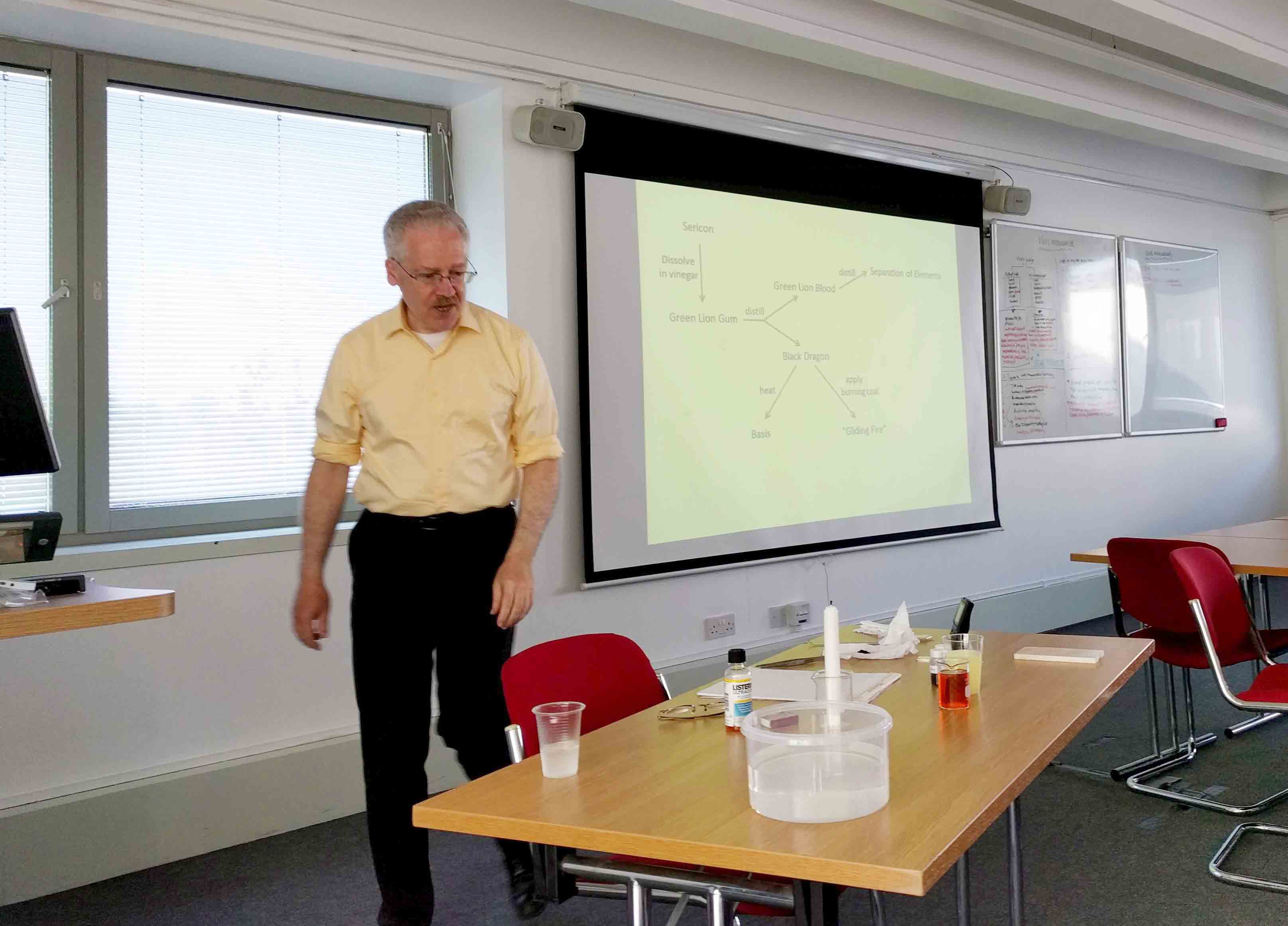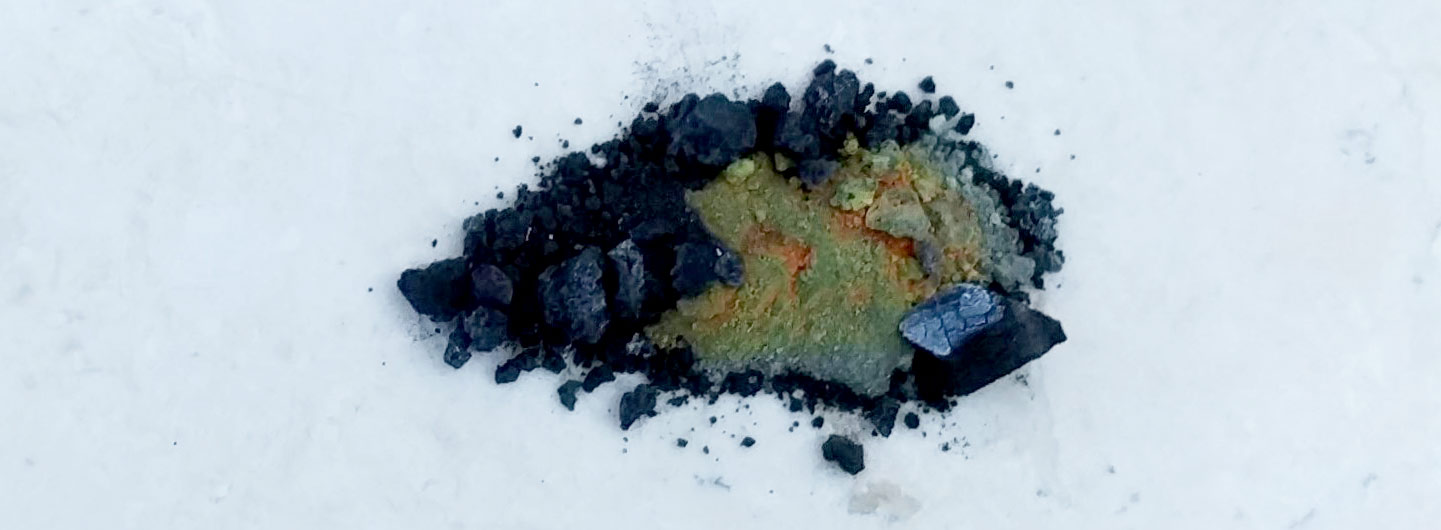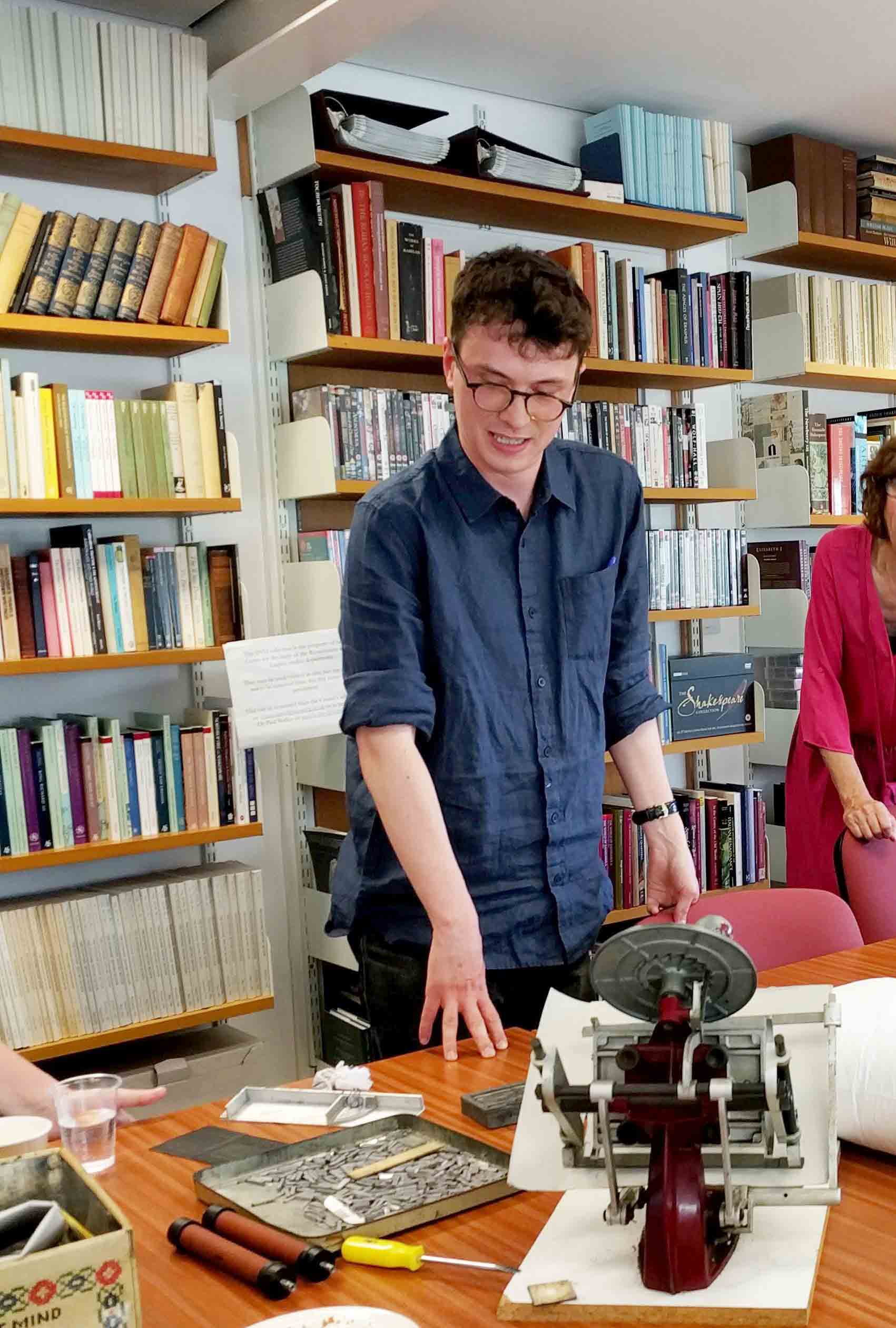Reproducing Alchemical Experiments
IATL Blogs and Reports
28th June 2018
Reproducing Alchemical Experiments
"Concerning alchemy it is difficult to discover the actual state of things..."
Michael Bycroft
"Concerning alchemy it is difficult to discover the actual state of things, in that the historians who specialise in this field seem sometimes to be under the wrath of God themselves; for, like those who write on the Bacon-Shakespeare controversy or on Spanish politics, they seem to become tinctured with the kind of lunacy they set out to describe."
We owe this unflattering description of historians of alchemy to the historian Herbert Butterfield, who was writing in 1949. The description was unfair in 1949, and it is absurd today, when the history of alchemy is a flourishing field of study with its own journals, conferences, textbooks, and even its own t-shirts (click here for an example https://www.teepublic.com/t-shirt/455208-lead-to-gold-teach-the-controversy).
Professor Lawrence Principe, Drew Professor in the Humanities at Johns Hopkins University, has done more than most historians of alchemy to make the field what it is today. In his first book, The Aspiring Adept: Robert Boyle and his Alchemical Quest (1998), Principe showed that the seventeenth-century experimenter Robert Boyle, far from rejecting alchemy as a pseudo-science, embraced it in some of most important chemical treatises.
In his most recent book, The Secrets of Alchemy (2013), Principe summarises several decades of scholarship which show that early modern alchemy had more in common with present-day chemistry than most people think. Alchemical texts may have been clothed in arcane and metaphorical language, but they were based on real chemical operations carried out with real substances, often with great skill and precision.

Professor Principe during the alchemical masterclass
In his own research, Principe has drawn on his interdisciplinary background – he has PhDs in Organic Chemistry and in the History of Science – to reproduce some important early modern alchemical experiments. These reproductions have helped historians to understand the symbols and operations described in early modern texts. They have also shown the virtuosity of early alchemists, who successfully performed chemical procedures – such as the volatilization of gold - that are difficult to carry out even in modern chemistry laboratories.
Principe visited Warwick as an International Visiting Fellow on May 7-11, 2018. His visit was supported by the IATL , the Institute for Advanced Study , the Early Modern and Eighteenth Century Centre and the Centre for the Study of the Renaissance . Principe ran a masterclass on alchemy, gave a public lecture on the history of gold-making, and participated in a workshop on the use of historical objects in teaching.
The masterclass got the visit underway with a bang. In a well-packed room – about 25 people were present, including historians, classicists and chemists - Principe gave a short history of alchemy and explained the various sources available to a historian of alchemy, namely texts, images and experimental reproductions. The latter give sensual information that are absent in most alchemical texts, for example about the colour and smell of chemical substances. They also shed light on the mysterious language of alchemical recipes, with their obscure substances (‘sericon’, ‘ferrum Philosophorum’), mysterious injunctions (‘beware thou burn not his Flowers’), and farfetched metaphors (‘cast away the Feces’, ‘the blood of the green lion’).
The terms in brackets are from a set of fifteenth-century instructions on how to make the philosopher’s stone, a substance that could supposedly be used to turn base metals into gold. Principe explained these instructions in the clearest possible way, by performing them before our very eyes. He showed a sample of ‘black Feces’ that he had made by distilling ‘sericon’. This sample, when placed next to a burning coal, was slowly overspread by (to quote the fifteenth-century author) ‘a Citrine colour, very glorious to behold.’ In the ensuring discussion Principe expanded on several topics in the history of alchemy: how it acquired a reputation for fraud and quackery, how early modern alchemists made a living, and how one might write a global or colonial history of alchemy.
In his public lecture, entitled ‘Alchemy at the Cutting-Edge: The Surprising Longevity of Gold-Making’, Principe took the story of metallic transmutation beyond 1800. Alchemy was slighted by the official spokespeople of the Paris Academy of Sciences from 1700 onwards, but the chemists at the Academy continued to look for ways of turning base metals into gold. Principe told the gripping and poignant story of Théodore Tiffereau, a chemist and photographer who persuaded himself that he had discovered the secret during a visit to Mexico in 1842.
Far from dismissing Tiffereau as a crackpot, the Paris Academy set up a commission to investigate his claims. This move made sense in light of contemporaneous developments in chemical theory. For example, some molecules (such as NH4 ) had been found to be extremely persistent in chemical reactions, raising the possibility that metals were molecules of this kind, and not pure elements. This in turn suggested that a metal such as lead could, with the right chemical operations, be broken into its elements and reconstituted as a different metal, such as gold. Alchemy was not a bizarre anomaly in chemical theory but a plausible consequence of it.
Even in the twentieth century, physicists made free use of the term ‘transmutation’ to describe the conversion of one metal into another through the fusion or fission of atomic nuclei. Chemistry, Principe concluded, has a ‘tortuous, unpredictable past’ that cannot be plotted on a straight line from alchemy to chemistry. The lecture was followed by questions from another large and varied audience – over 30 people were in attendance.

The results of an alchemical experiment, showing a 'citrine colour, very glorious to behold' spreading across a sample of 'black feces'
As well as the masterclass and public lecture, Principe took part in a small workshop on the use of historical objects in undergraduate and graduate teaching. Doing historic experiments for research purposes is one thing; building them into the university curriculum is another. The workshop brought together ten Warwick staff and students to explore how this can be done. The format was show-and-tell: seven of the staff gave short demonstrations of objects and instruments they use in their teaching, including a Grecian vase, Carthaginian coins, an ancient cure for the common cold, a medieval cure for eye infection, an exploding glass drop, and a working printing press from the early twentieth century.

Dr. James Poskett presenting a printing press
Principe’s week-long visit gave him ample time for private meetings. As the Director of the Singleton Centre for the Study of Premodern Europe he attended a meeting with members of the Centre for the Study of the Renaissance to plan the next stage of the ongoing collaboration between the two Centres. He also made time for one-on-one discussions with Warwick faculty, meeting a classicist to discuss a project on ancient alchemy and medicine, a life scientist to discuss the chemistry of Medieval medicines, and a historian of science to discuss the trade in alchemical secrets in France around 1700 (and to offer a secret of his own, namely the detailed modern recipe for the distillation of ‘black feces’ from ‘sericon’).
The visit was a success on several fronts. It opened up the history of alchemy to a wide (and often wide-eyed) audience. It paved the way for the introduction of more historical artefacts into teaching at Warwick. It showed the value of combining the skills of the scientist with those of the scholar. And it advanced several research projects that Principe is working on in parallel with Warwick faculty in Classics, History, and Renaissance Studies.
‘He was a bit obsessive perhaps, but not a lunatic.’ So said Principe of Théodore Tiffereau. The same could be said of the modern historian of alchemy. Obsessive in the best sense – passionate, persistence and painstaking – but certainly not lunatic.
